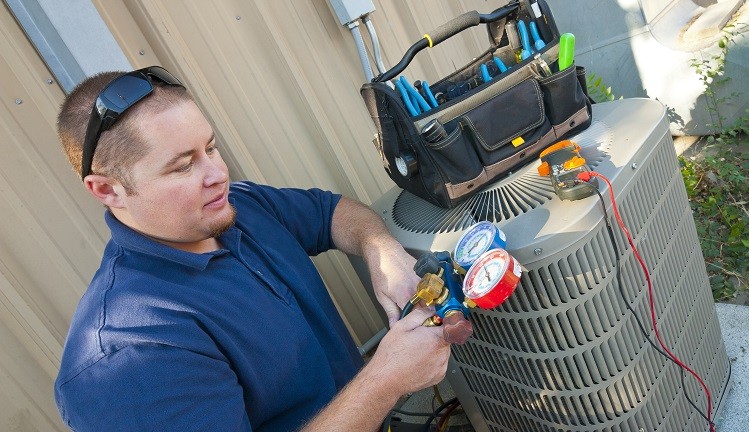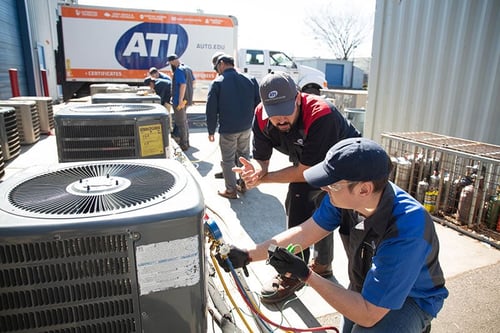Heating Contractor Focusing On Efficient Home Heating Solutions
A Comprehensive Look at A/c Solutions and Their Effect On Energy Effectiveness and Cost Cost Savings
The duty of cooling and heating services in enhancing power effectiveness and achieving cost savings is more crucial than ever, as businesses and property owners seek sustainable solutions in a progressively eco-conscious globe. With technological developments like clever thermostats and high-efficiency parts, the potential for enhancing system efficiency is vast. Yet, real effect of these innovations depends greatly on regular upkeep and aggressive issue administration. As we explore the intricate connection in between heating and cooling systems and functional costs, including the shift in the direction of environmentally friendly choices, the question develops: exactly how can these approaches be efficiently executed to make the most of both financial and environmental benefits?

Value of A/c Solutions
HVAC systems are a vital part of contemporary buildings, playing an important duty in keeping comfy and healthy and balanced indoor settings. These systems, incorporating air, air flow, and home heating conditioning, are essential for managing temperature, moisture, and air quality, therefore making certain the wellness of owners. Reliable cooling and heating systems contribute substantially to producing an ideal indoor environment, which is critical for both domestic and commercial areas.
In business buildings, cooling and heating systems are integral to offering a risk-free and effective environment. By controlling interior climate problems, these systems assist avoid the development of mold and the spread of air-borne pollutants, thus guarding the health of workers and consumers. In addition, in property settings, cooling and heating systems improve living conditions by supplying regular thermal comfort and boosting indoor air high quality, which is vital for overall wellness.
In addition, the design and upkeep of heating and cooling systems have a straight effect on power intake and functional expenses. Appropriately designed and kept systems can significantly decrease energy use, bring about lowered energy costs and a smaller carbon footprint. The efficiency of these systems thus plays a critical role in promoting sustainability and energy preservation within structures, highlighting their relevance in the modern-day building landscape.
Developments in Cooling And Heating Modern Technology
Innovation in HVAC technology is reinventing the way structures handle indoor environments, ushering in a new period of efficiency and control. Recent improvements have concentrated on enhancing energy intake while boosting individual convenience. One notable development is the integration of smart thermostats, which utilize expert system to find out tenancy patterns and change temperatures accordingly, reducing unneeded energy use.
Variable Refrigerant Circulation (VRF) systems stand for an additional significant leap forward. These systems permit exact temperature level control in various zones of a structure, boosting convenience and lowering power waste. VRF innovation is particularly helpful for huge industrial areas, offering versatility and scalability.
In addition, the advent of Internet of Things (IoT) devices has actually changed heating and cooling systems right into interconnected networks efficient in real-time data collection and analysis. This connection allows predictive maintenance, making certain systems operate at peak effectiveness and reducing unexpected downtime.
Moreover, innovations in materials and design, such as the use of high-efficiency coils and compressors, have actually boosted total system performance - Heating Contractor. The fostering of eco friendly cooling agents additionally underscores the market's commitment to sustainability
These technical technologies are pivotal in minimizing operational costs and environmental effect, setting brand-new requirements for developing environment monitoring.
HVAC Upkeep and Effectiveness
Making certain ideal performance of HVAC systems expands past technological developments; it additionally hinges on effective upkeep methods. Regular maintenance is essential for sustaining efficiency, lowering power consumption, and prolonging the life expectancy of heating and cooling systems. The main goal is to guarantee that all elements operate at their peak potential, thus decreasing energy wastefulness and keeping consistent interior comfort levels.
Regular upkeep jobs, such as cleansing or changing air filters, inspecting refrigerant levels, and examining ductwork for leakages, are necessary for stopping unneeded strain on the system. Clogged or filthy filters can block air flow, triggering the system to work more difficult and consume even more energy. Also, inadequate refrigerant levels can lower cooling performance, resulting in greater operational split ac unit cost expenses.
Furthermore, routine inspections by certified specialists can identify possible issues before they rise into expensive repairs or system failures. These inspections typically consist of examining electrical connections, calibrating thermostats, and making sure the total honesty of the a/c system. By attending to minor troubles early, businesses and home owners can prevent unanticipated failures and enhance power efficiency.
Affordable HVAC Solutions
For those looking to get the most out of their air, home heating, and air flow conditioning systems without damaging the bank, discovering cost-effective heating and cooling solutions can make a substantial difference. One instant action is to buy programmable thermostats, which allow individuals to establish particular temperatures for various times of the day, maximizing energy use and reducing unneeded consumption. By automating temperature level changes, home owners can attain substantial savings on power bills.
Regular upkeep is one more vital part of cost-effective a/c management. Guaranteeing that filters are cleaned or replaced routinely, ductwork is secured, and units are serviced by specialists can stop costly repair work and improve system longevity. Precautionary upkeep not only keeps system effectiveness however also aids in avoiding unanticipated malfunctions that can result in pricey emergency situation fixings.
Additionally, retrofitting existing systems with energy-efficient elements, such as variable rate motors or high-efficiency compressors, can be a prudent investment. These upgrades enhance operational effectiveness, reduce energy use, and can commonly be executed at a portion of the price of a complete system substitute.
Ecological Impact Decrease
Lowering the ecological impact of HVAC systems is important in today's search of lasting living. HVAC systems are considerable contributors to energy usage, accounting for virtually 40% of power usage in industrial structures.
Technological advancements in cooling and heating style and procedure, including the combination of wise thermostats and energy-efficient warm pumps, are pivotal in lowering carbon footprints. These innovations allow for optimized energy use, minimizing waste and improving overall system efficiency. Additionally, embracing regular maintenance methods makes certain a/c systems run at peak performance, additional curtailing unnecessary power consumption.
In addition, using eco-friendly cooling agents is vital, as traditional refrigerants, like CFCs and HCFCs, have been eliminated as a result of their ozone-depleting residential or commercial properties. Modern alternatives, such as hydrofluoroolefins (HFOs), deal lowered environmental threats, aligning with global ecological air solutions procedures. By accepting these sustainable techniques, a/c solutions can play a transformative role in minimizing ecological effects, promoting power effectiveness, and promoting a more lasting future.
Final Thought

Additionally, the style and maintenance of Heating and cooling systems have a straight effect on power usage and operational expenses. Regular upkeep is crucial for maintaining effectiveness, reducing energy consumption, and expanding the life span of Cooling and heating systems. Cooling and heating systems are substantial factors to power consumption, accounting for almost 40% of energy use in business buildings. Furthermore, taking on regular upkeep techniques makes certain Cooling and heating systems operate at peak efficiency, further curtailing unnecessary power usage.
The transition to ecologically pleasant A/c systems additionally lowers operational basics costs and advertises sustainability. (Heating Contractor)